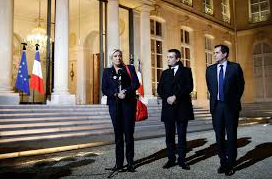With France taking the EU presidency, many worry the country’s divisive anti-Muslim rhetoric will influence broader European policymaking.
As France takes over the rotating EU presidency for the next six months, President Emmanuel Macron will likely push for greater “strategic autonomy” in Europe. However, there is growing concern among many European Muslims that the country’s toxic, anti-Muslim political discourse could spill over into EU policymaking during this time.
In the lead-up to France’s presidential elections in April 2022, the country’s political landscape has seen a rise in Islamophobic rhetoric, with some political figures using anti-Muslim sentiment as a strategy to gain votes. The far-right has long been associated with these divisive views, but now, even mainstream candidates are increasingly adopting hardline stances on Islam and immigration.
Macron’s interior minister, Gérald Darmanin, recently accused far-right candidate Marine Le Pen of being too lenient on Islam, while other candidates, like Éric Zemmour, have ramped up anti-Muslim rhetoric with alarming intensity. Valérie Pécresse of the Les Républicains party has also made controversial statements, including banning the wearing of burkinis in certain public spaces.
Under Macron’s leadership, France has enacted several policies targeting its Muslim population, including the so-called “anti-separatism” bill, aimed at curbing the influence of Islam in French society. The government has also been criticized for shutting down organizations like the Collective Against Islamophobia in France, which documents anti-Muslim hate crimes. This has led to fears of a full-blown “Islamophobic witch-hunt,” as Muslim-led organizations, mosques, and schools face increased scrutiny and closures.
With France now holding the EU presidency, many European Muslims are apprehensive that these policies will set a troubling precedent, potentially influencing broader EU discussions on race, religion, and immigration.








